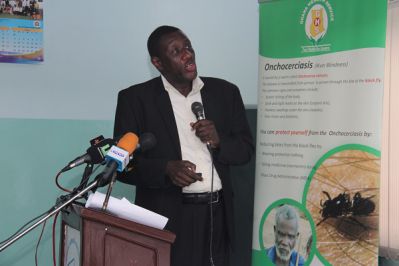
Mass drug administration on NTDs begins Monday
The Ghana Health Service is to embark on a community mass drug administration for neglected tropical diseases (NTDs) in 126 districts nationwide on Monday.
The exercise will focus on two main NTDs: elephantiasis and river blindness.
The Director-General of the Ghana Health Service, Dr Anthony Nsiah-Asare, announced this in a speech read on his behalf at a media engagement in Accra yesterday.
He said the annual exercise formed part of the efforts of the service to manage and eradicate NTDs that had become endemic in the country.
NTDs
Dr Nsiah-Asare defined NTDs as a group of 20 infections and parasitic diseases which affected more than a billion people worldwide, most of whom lived in extreme poverty.
He said although NTDs had a low mortality rate, they were often chronic, debilitating and disabling.
They cause blindness, swelling of the limbs and other body parts as well as skin rashes and thickening.
Dr Nsiah-Asare mentioned 14 NTDs in the country to include elephantiasis, lymphatic filariasis, yaws, bilharzia, buruli ulcer, leprosy, intestinal worms, trachoma and sleeping sickness.
"The Ghana Health Service and its partners have over the years collaborated to control and eliminate NTDs in the country. Through this collaboration, blinding trachoma was eliminated in the country in 2018," he added.
Advertisement

Transmission of elephantiasis was also broken in 83 out of the 98 elephantiasis endemic districts in the country.
According to Dr Nsiah-Asare, currently, there were 15 elephantiasis hotspot districts in the country and that, the National Neglected Tropical Diseases Control Programme was collaborating with partners to find viable ways to break transmission in those areas.
The Director-General said major strategies adopted towards the elimination of some of the NTDs such as elephantiasis, river blindness, intestinal worm infestation and bilharzia were through mass drug administration, clinical management of all morbidity cases and health education and promotion.
Victims
The Programme Manager of NTD at the GHS, Dr Benjamin Marfo, explained that NTDs affected the poor because they were often malnourished, had weak immune systems and lived in insanitary environments often characterised by open defecation and urination.
He, therefore, appealed to beneficiary communities to disregard rumours that the drugs were life threatening and rather take advantage of the exercise because the drugs were potent.
The manager, however, expressed concern about the stigmatisation of patients suffering from NTDs, saying, because of such stigmatisations, many sufferers hid their conditions and refused to seek medication.
He called for a concerted effort in the early detection of the diseases to enable health personnel to eradicate them in the country by 2025.
Elephantiasis
On elephantiasis, Dr Marfo said the condition which manifested in the enlargement and hardening of limbs or body parts due to tissue swelling, was not transmitted from person to person but by the female anopheles mosquito.
"The term elephantiasis is often used in reference to (symptoms caused by) parasitic worm infections but may refer to variety of diseases where parts of a person's body swells to massive proportions.
It may affect the genitals." he added.
Appeal
The Ambassador for the National NTD Campaign, Rev. Joyce Aryee (H.C), appealed to the people to adhere strictly to basic sanitary principles to help eradicate NTDs.
She noted that if there were no breeding grounds for mosquitoes which carried the parasites that transmitted NTDs, the national burden would drastically reduce.
Writer's [email protected]